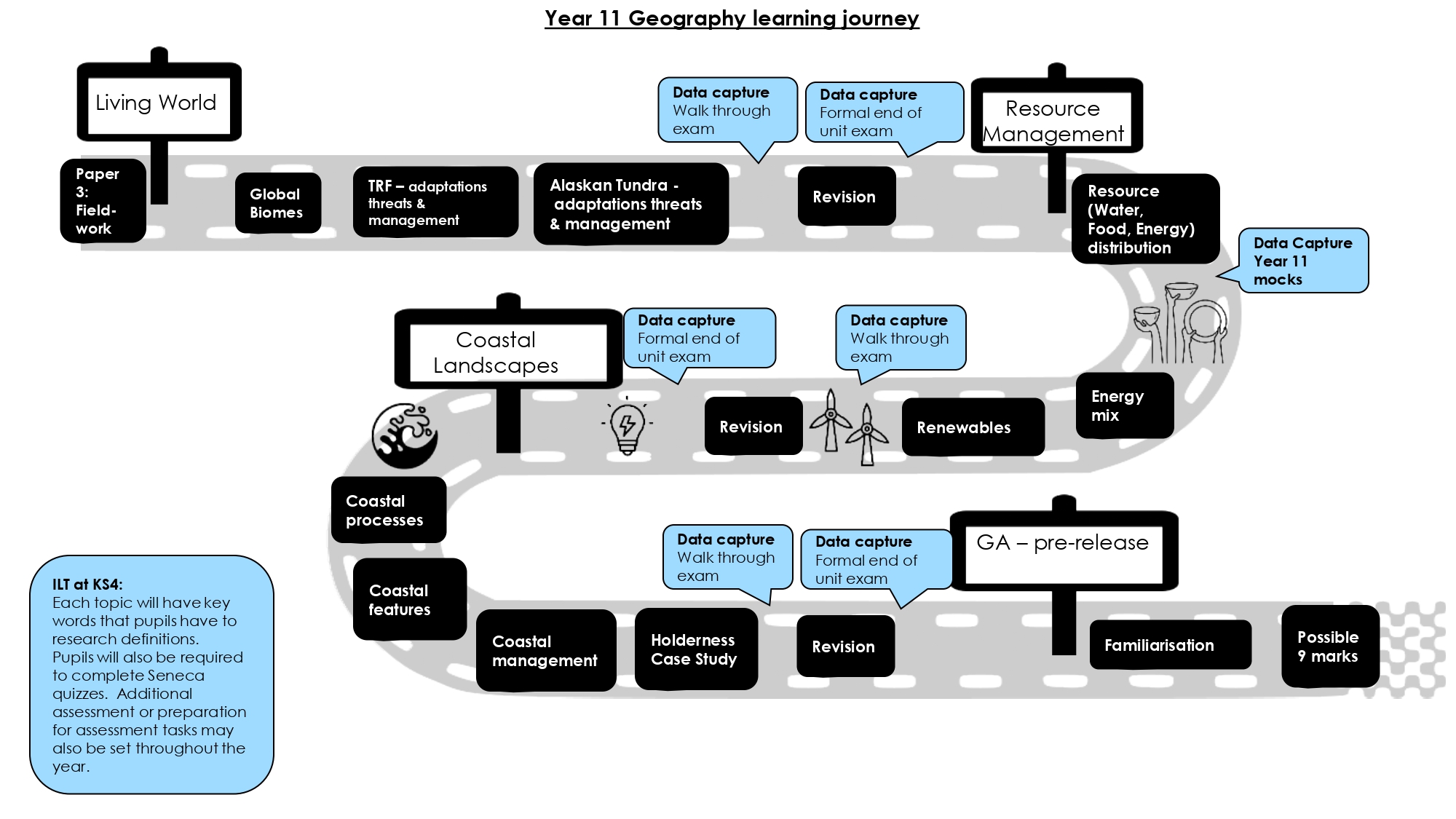Geography
Why do we study Geography?
Students study Geography so they can understand the world around them and their impact upon it. There is no escaping Geography, whether it be stories in today’s news feeds or trying to understand features that have been there for centuries; Geography is everywhere. It is important for us to develop students’ curiosity in terms of their own place in and impact upon the global communities; socially, environmentally and economically.
Hurworth Geographers are introduced to the main themes of Geography that are woven through everything we do.
- Place, space and scale: from Year 7s learning continents and map skills, right through to Year 11s knowing the importance of both their Urban case studies of Newcastle and Lagos; our students must learn more about where places are and their importance in a range of scales.
- Physical and human processes and interactions and interconnectedness should be highlighted: Each year group interleave physical and human topics to ensure that students realise the subdivision upheld within Geographical spheres. What is equally important is the topic of Global Issues that really challenges the interactions between the physical realm and human interference thereof.
- Environmental interaction and sustainability: every process, theory or model has to be challenged under the guise of whether it is sustainable. This is the realm that really brings Geography into the forefront of relevance for our students, as their generation more than many before them are socially challenging each other to ensure we are better caretakers of this earth.
- Cultural understanding and diversity: so much of what we study has in depth opportunities to cover SMSC themes. Through migration, international relationships, trade vs aid, emergency relief, development and resource exploitation our young Geographers learn an appreciation that they are part of a much larger global community and they have a duty to be responsible respectful citizens.
Throughout their time at Hurworth we offer students a breadth of global, national and local knowledge. Whilst studying Geography students will learn the transferable skills of being able to collect, analyse and communicate a range of data, to interpret a range of sources and be able to communicate geographical information in a variety of ways (both quantitative and qualitative).
Each year our young Geographers will be exposed to a wide range of graphs, maps, statistics, articles, GIS, theories and models, and will be challenged to form their own evidence based opinions. Where we can we get outside of the classroom to investigate through fieldwork. At KS3 our students are assessed twice for each topic (mid-point and end of topic) along with extended Independent Learning Tasks (ILTs).
Our department has a wealth of experience, both in terms of teaching Geography, careers in Industry prior to teaching and importantly getting out there and exploring everyday Geography for ourselves. We hope our love of Geography is clear to our students.
Year 7
Learning Outcomes
Year 7 baselines students prior learning and moves forward introducing each of the key Geographical principles and key themes that underpin the remainder of their Geography lessons at KS3, KS4 and hopefully beyond.
Topics Taught
Autumn Term
Introduction to Geography
• Physical or human
• Development
• Cause effect and response
• Case studies and revision
Geographical Skills
• Continents, including lines of latitude and longitude
• Compass directions
• Map symbols
• Grid references
• Relief
• Scale
• Photo analysis
• Site and situation
• Outdoor map lesson
Spring Term
Weather & Climate
• Water cycle
• Measuring weather
• Types of rain
• Types of clouds
• Climate graphs
• Extreme weather
• Depressions
• Anticyclones
• Global weather patterns
• Forecasting
Summer Term
UK
• Component parts
• Physical UK
• Human UK
• Regional importance of North East
• Links to wider world, employment
• Government
• Tourism
• Census
• Crime
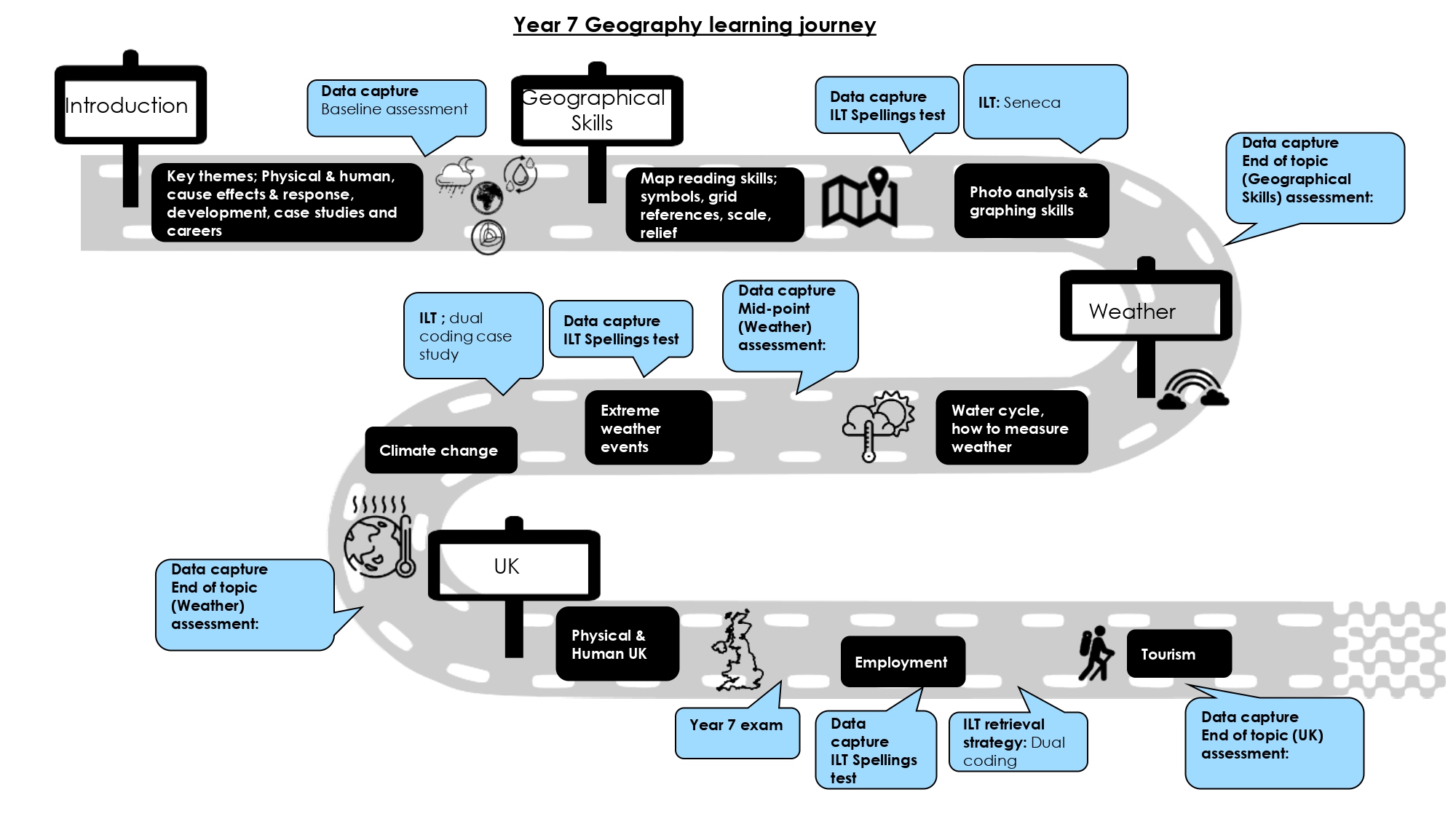
Year 7 Documents (click to download)
Year 8
Learning Outcomes
Building upon Year 7s key principles and skills, in Year 8 we apply these to a wider variety of global locations and physical environments. Students fully engage with how diverse the world is and develop their understanding of the interlinkages between physical and human environments.
Topics Taught
Autumn Term
Ecosystems
• Global biomes
• Hot desert (climate graph, adaptations and management)
• Tropical rainforests (climate graph, adaptations and management)
• Savanna (climate graph, adaptations and management)
• Coral reef (climate graph, adaptations and management)
• Ecotourism
• Bush tucker trial
Spring Term
Global Issues (the exact content of this topic will change as the media raises the profile of other challenges)
• Population change
• Population employment
• Migration
• Palm oil
• Ocean plastics
• Fatburgs
• Climate change
• Brexit
Summer Term
Geomorphological Processes
• Drainage basins
• Erosional process and features
• Transportation process and features
• Depositional features
• Waterfalls
• Flooding
• Coastal erosion
• Longshore drift
• Cliff collapse
• Coastal management
• Glacial processes and features
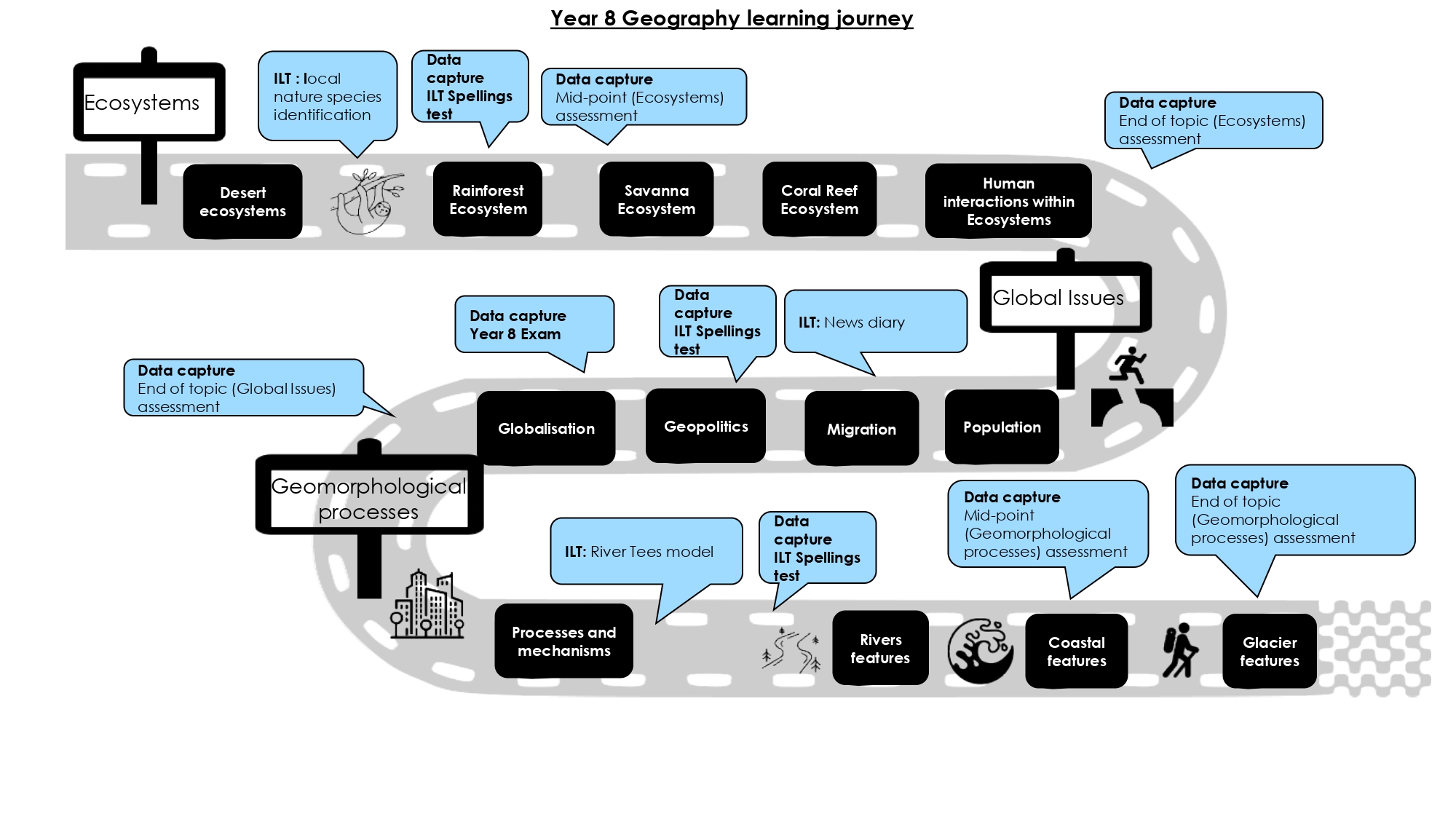
Year 8 Documents (click to download)
Year 9
Learning Outcomes
In Year 9 we push students learning further and deeper by adding layers to the connections between social, environmental and economic worlds. We embed principles of cause, effect and response, levels of development whilst maintaining map skills.
Topics Taught
Autumn Term
Development & Conflict
• DTM
• Population pyramids
• Ageing population
• Gap minder
• Development indicators
• Development inequalities
• Trade game
• Illegal trade
• Fairtrade
• Debt relief
• Tourism
• Industrial development
• Lagos TNC case study
• North South divide
Spring Term
Hazards
• Layers of the earth
• Plate boundaries
• Montserrat eruption
• Icelandic eruption
• Nepalese earthquake
• Earthquake proof buildings
• Tsunamis
• 3Ps
• Atmospheric theory
• Formation of tropical storm
• Haiyan
• Extreme weather
• Cumbria flooding
• GIS
Summer Term
Urban Issues & Challenges (first KS4 topic)
• Global patterns
• Migration
• Megacities
• LIC/NEE city challenges and opportunities
• Major city in UK challenges and opportunities
• Redevelopment
• Sustainability
• Urban sprawl
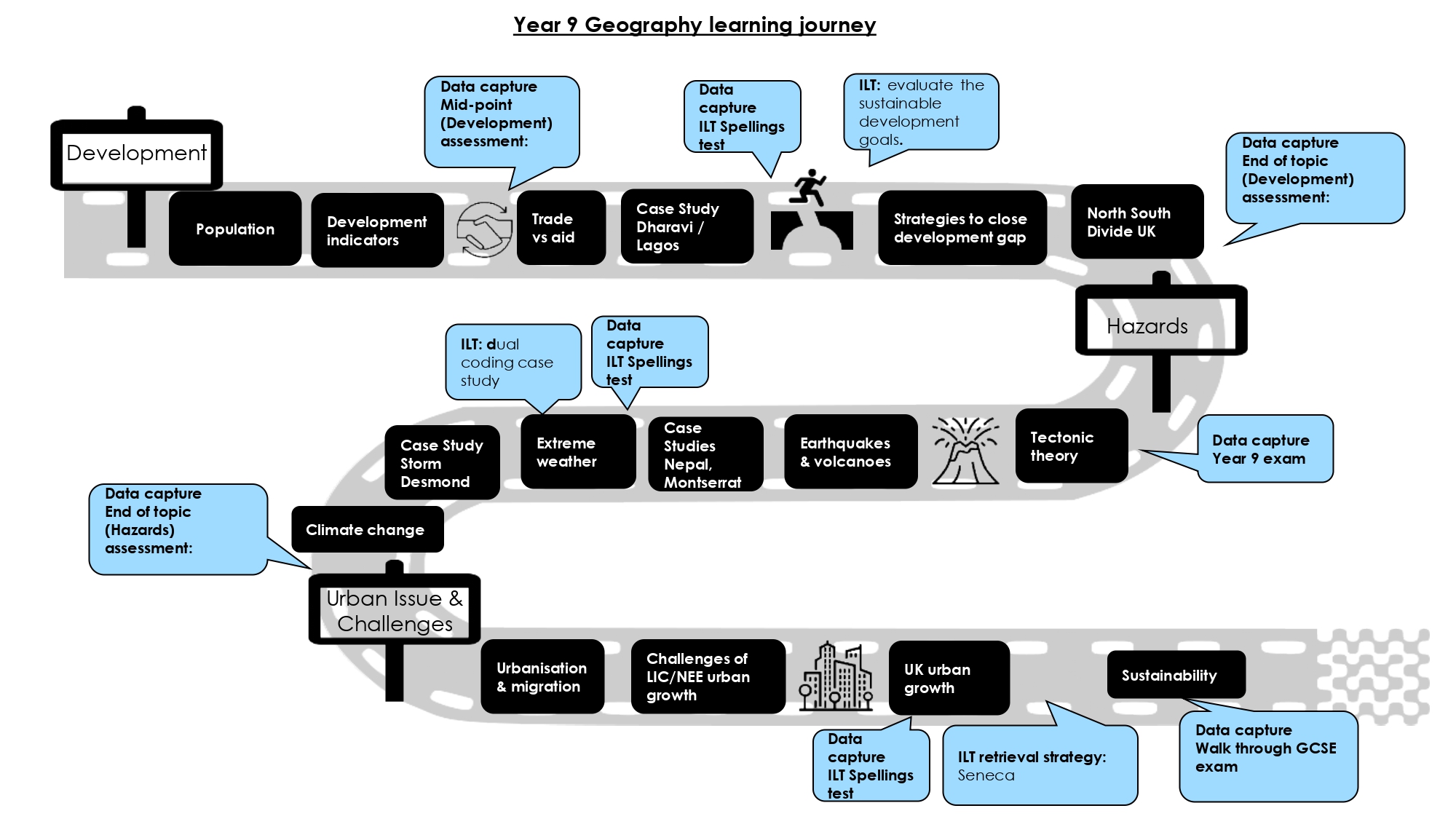
Year 9 Documents (click to download)
Year 10
Exam Specification
GCSE Geography
AQA Specification
Learning Outcomes
The first year of Key Stage 4 is front loaded with course content. We guide students to realise the value of their prior learning, whilst progressing knowledge and analytical skills within the prescription of AQA exam style questioning. Students also complete their fieldwork within Year 10.
Topics Taught
Autumn Term
Hazards
• Types of hazard
• Distribution of hazards
• Plate tectonic theory
• Effects and responses to tectonic hazard
• Why live in tectonically active area
• Atmospheric circulation
• Distribution of tropical storms
• Effects and responses of tropical storm
• Climate change impacts
• Weather hazard in the UK
• Managing climate change
Spring Term
Changing Economic World
• Classification and development indicators
• Link DTM to development
• Causes of uneven development
• Strategies to reduce the development gap
• LIC/NEE case study TNCs
• UK economic future
• Post-industrial economy
• North south divide
River Landscapes of the UK
• Hydrological cycle
• Fluvial processes
• Landforms (waterfall, gorge, meanders, ox-bow lakes, levees and floodplains)
• Factors affecting flooding
• Hydrographs
• Management (hard and soft engineering)
Summer Term
Geographical Applications (Paper 3 fieldwork)
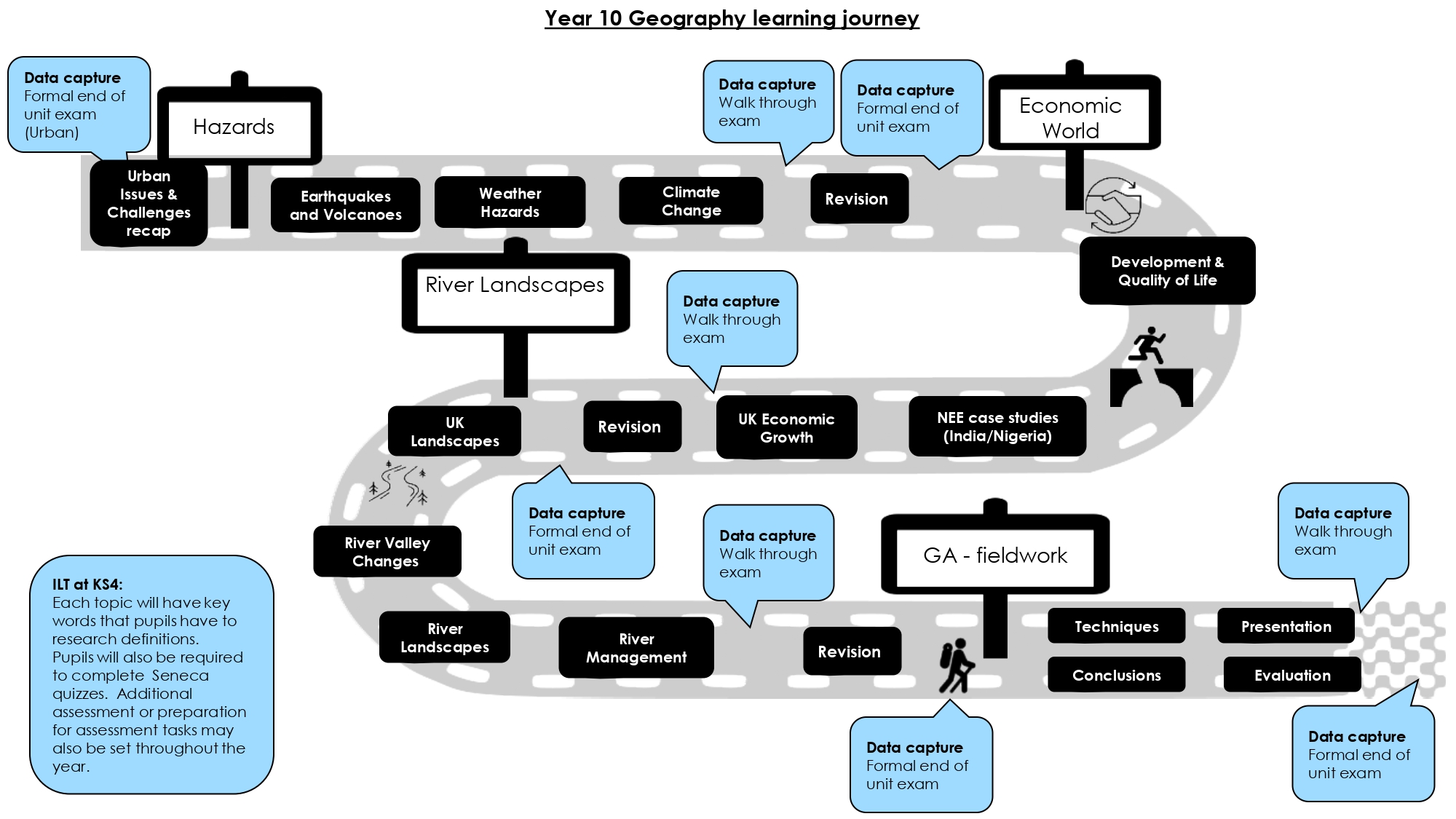
Year 10 Documents (click to download)
Year 11
Exam Specification
GCSE Geography
AQA Specification
Learning Outcomes
Year 11s finish the course content by early spring, leaving sufficient time to dedicate to the pre-release element of the course and fine tuning exam technique. The assessment cycle is stepped up in Year 11 to allow students to review, reflect and progress to their full potential
Topics Taught
Autumn Term
The Living World
• Global biomes
• Nutrient cycle
• Food chains
• Tropical rainforest (climate, adaptations, threats and management)
• Tundra (climate, adaptations, threats and management)
The Challenge of Resource Management
• Increased demand for food
• Water and energy
• Energy mix in UK
• Importing (challenges and opportunities)
• Renewable vs non-renewable energy
• Other sources of energy
• Wider issues for UK energy supply
• Sustainability
Spring Term
Coastal Landscapes in the UK
• Waves
• Mass movement
• Erosional features
• Depositional features
• Climate change
• Management (soft and hard engineering)
Pre-Release (Paper 3)
• Comprehension of sources
• Possible questions
• Stakeholder opinions
Summer Term
Formal assessments
